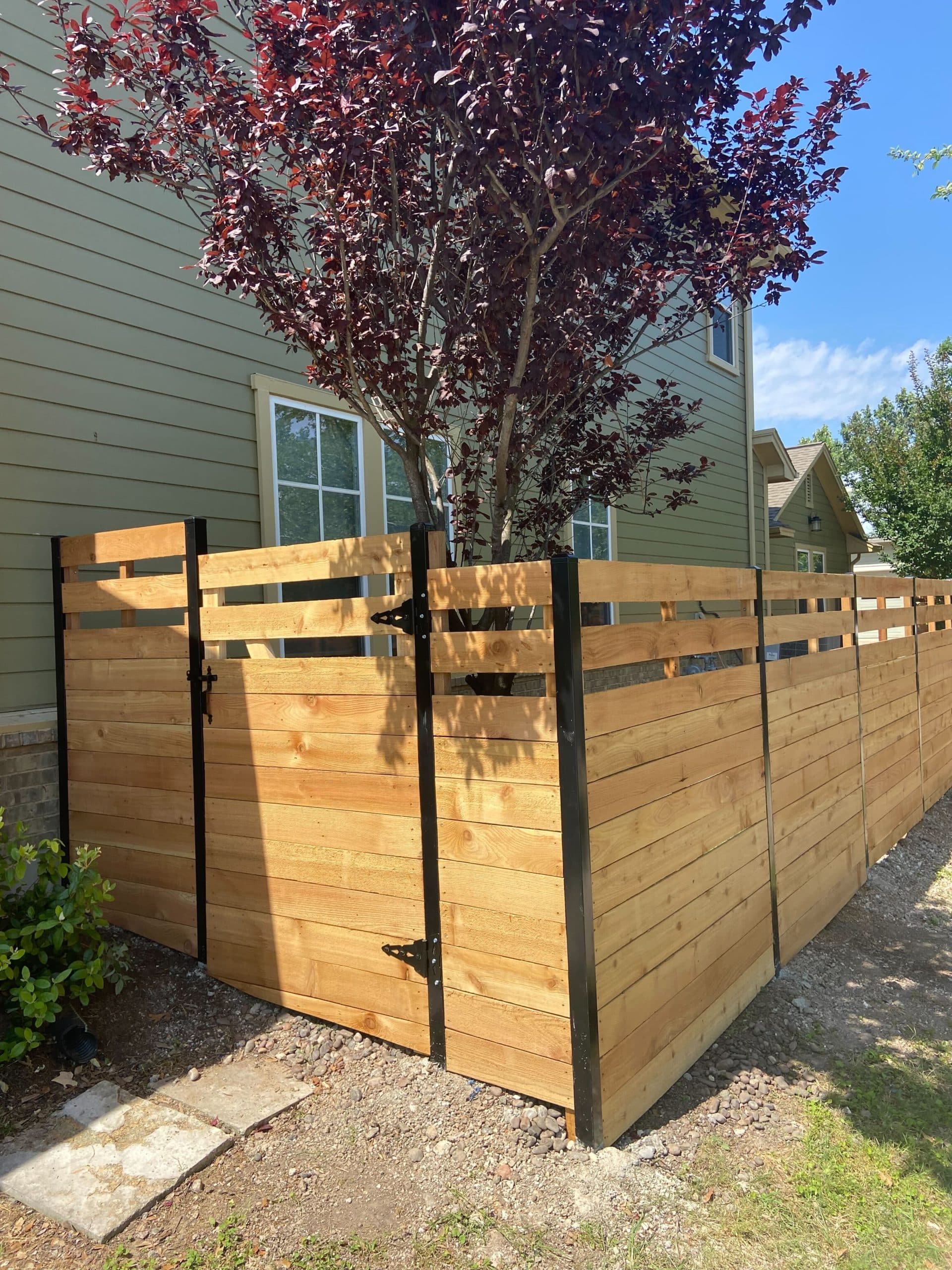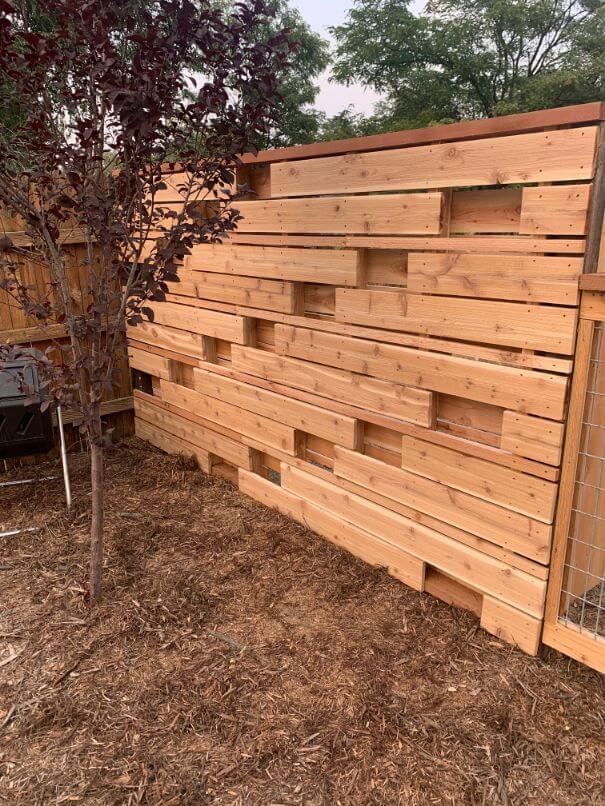All Categories
Featured
When picking a fence for your home, it's necessary to take into consideration variables like expense, sturdiness, upkeep, and visual charm. 3 of the most preferred materials for household and business fencings are light weight aluminum, wood, and vinyl. Each deals distinct advantages and some disadvantages, making it essential to examine your requirements before choosing. Below, we contrast the benefits and drawbacks of these products to aid direct your choice.
Wood Fencing. Pros:
![]()
All-natural Visual: Wood fencings are known for their classic, natural appearance. They can conveniently blend into a lot of landscapes and enhance the charm of your home or service. Whether you're going for a rustic look or a more sleek coating, timber can be tailored with paint, stain, or sealer. Modification: Timber is one of one of the most functional materials, enabling a wide range of styles, such as picket fencings, personal privacy fencings, and ranch-style rooms. It's simple to change the layout to fit the specific needs of your home. Economical: Usually, wood fencings come at a lower initial expense compared to plastic or aluminum, making them a cost-effective choice for those on a budget. Cons:
Maintenance Requirements: Timber fencings require routine maintenance to maintain their charm and capability. This consists of staining or painting to shield versus rot, termites, and weather condition damages. Without correct care, timber can deteriorate over time. Much Shorter Life-span: Contrasted to plastic or light weight aluminum, timber fencings tend to have a shorter lifespan, especially in areas with severe climate. Extreme conditions, such as hefty rainfall, moisture, or snow, can cause timber to weaken quicker. Prone to Damage: Timber fences are vulnerable to damage from pests, consisting of termites, in addition to natural wear from weather. They may likewise warp or split otherwise correctly maintained. Plastic Secure fencing. Pros:
Reduced Upkeep: Among the major benefits of plastic fences is that they need minimal maintenance. Unlike timber, plastic does not require to be painted, sealed, or tarnished. It's immune to fading, discoloration, and breaking, which saves time and cash on maintenance. Resilience: Plastic is known for its capability to stand up to severe weather problems without deteriorating. It's invulnerable to bugs like termites, and its resistance to dampness and UV rays guarantees it remains looking great for several years. Durable: A plastic fencing can last up to three decades or more, making it a great long-lasting financial investment. Many producers offer guarantees, additionally enhancing its value. Range of Styles: Vinyl fences are available in various colors and designs, consisting of those that simulate timber. You can select from privacy, picket, or attractive designs, supplying flexibility to match your home or service. Cons:
![]()
Higher Upfront Expense: Plastic fencings have a tendency to have a greater preliminary cost than wood. While the long-lasting cost savings on maintenance are considerable, the ahead of time financial investment might be a deterrent for some homeowners. Limited Modification: Vinyl fences come in basic designs, and while colors and styles are different, you may not have as much flexibility for modification compared to wood. Fracturing in Cold Climates: While plastic is sturdy, in exceptionally chilly environments, it can become brittle and fracture upon influence, which might be problematic in locations with severe winters months. Light weight aluminum Fencing. Pros:
Low Maintenance: Light weight aluminum fences are known for their low-maintenance demands. Unlike wood, aluminum doesn't rust or wear away, and it does not need to be repainted or sealed. This makes it an excellent selection for those who desire a hassle-free alternative. Toughness and Strength: Light weight aluminum is a durable material that stands well to harsh climate condition. It's an excellent choice for seaside areas where saltwater corrosion is a problem, as it's resistant to corrosion. Visual Allure: Light weight aluminum fences supply a clean, sophisticated look, commonly made use of for decorative purposes. They're readily available in numerous styles, consisting of ornamental layouts, and can add a high-end feeling to your residential or commercial property. Safety and security: Aluminum fencings are long lasting and offer fantastic safety and security, especially when installed with entrances or locks. Their sturdy construction gives a reputable obstacle against unwanted entrance. Cons:
![]()
Greater First Expense: Light weight aluminum fences often tend to be extra costly than wood, especially if you go with ornamental designs. The in advance price might be too high for some. Less Personal privacy: Aluminum fences generally have bigger voids in between the slats, which means they offer less privacy than timber or plastic fences. If seclusion is a priority, light weight aluminum might not be the very best choice. Denting Problems: While aluminum is rust-resistant, it is at risk to bending or nicking if struck with force. For instance, a lorry crash or hefty effect can trigger long-term damages to the fence. Which Fence Product is Right for You? Selecting the right fence depends on a number of variables, including your budget, style preferences, maintenance capacity, and the setting in which you live. If you want an all-natural appearance and are prepared for routine maintenance, timber could be the right choice.
Ultimately, each fencing product has its cons and pros, so it is essential to evaluate what matters most for your certain needs. Take into consideration the climate, the level of privacy you call for, and how much maintenance you're prepared to commit to, and you'll locate the best fencing for your residential or commercial property.
Wood Fencing. Pros:

All-natural Visual: Wood fencings are known for their classic, natural appearance. They can conveniently blend into a lot of landscapes and enhance the charm of your home or service. Whether you're going for a rustic look or a more sleek coating, timber can be tailored with paint, stain, or sealer. Modification: Timber is one of one of the most functional materials, enabling a wide range of styles, such as picket fencings, personal privacy fencings, and ranch-style rooms. It's simple to change the layout to fit the specific needs of your home. Economical: Usually, wood fencings come at a lower initial expense compared to plastic or aluminum, making them a cost-effective choice for those on a budget. Cons:
Maintenance Requirements: Timber fencings require routine maintenance to maintain their charm and capability. This consists of staining or painting to shield versus rot, termites, and weather condition damages. Without correct care, timber can deteriorate over time. Much Shorter Life-span: Contrasted to plastic or light weight aluminum, timber fencings tend to have a shorter lifespan, especially in areas with severe climate. Extreme conditions, such as hefty rainfall, moisture, or snow, can cause timber to weaken quicker. Prone to Damage: Timber fences are vulnerable to damage from pests, consisting of termites, in addition to natural wear from weather. They may likewise warp or split otherwise correctly maintained. Plastic Secure fencing. Pros:
Reduced Upkeep: Among the major benefits of plastic fences is that they need minimal maintenance. Unlike timber, plastic does not require to be painted, sealed, or tarnished. It's immune to fading, discoloration, and breaking, which saves time and cash on maintenance. Resilience: Plastic is known for its capability to stand up to severe weather problems without deteriorating. It's invulnerable to bugs like termites, and its resistance to dampness and UV rays guarantees it remains looking great for several years. Durable: A plastic fencing can last up to three decades or more, making it a great long-lasting financial investment. Many producers offer guarantees, additionally enhancing its value. Range of Styles: Vinyl fences are available in various colors and designs, consisting of those that simulate timber. You can select from privacy, picket, or attractive designs, supplying flexibility to match your home or service. Cons:

Higher Upfront Expense: Plastic fencings have a tendency to have a greater preliminary cost than wood. While the long-lasting cost savings on maintenance are considerable, the ahead of time financial investment might be a deterrent for some homeowners. Limited Modification: Vinyl fences come in basic designs, and while colors and styles are different, you may not have as much flexibility for modification compared to wood. Fracturing in Cold Climates: While plastic is sturdy, in exceptionally chilly environments, it can become brittle and fracture upon influence, which might be problematic in locations with severe winters months. Light weight aluminum Fencing. Pros:
Low Maintenance: Light weight aluminum fences are known for their low-maintenance demands. Unlike wood, aluminum doesn't rust or wear away, and it does not need to be repainted or sealed. This makes it an excellent selection for those who desire a hassle-free alternative. Toughness and Strength: Light weight aluminum is a durable material that stands well to harsh climate condition. It's an excellent choice for seaside areas where saltwater corrosion is a problem, as it's resistant to corrosion. Visual Allure: Light weight aluminum fences supply a clean, sophisticated look, commonly made use of for decorative purposes. They're readily available in numerous styles, consisting of ornamental layouts, and can add a high-end feeling to your residential or commercial property. Safety and security: Aluminum fencings are long lasting and offer fantastic safety and security, especially when installed with entrances or locks. Their sturdy construction gives a reputable obstacle against unwanted entrance. Cons:

Greater First Expense: Light weight aluminum fences often tend to be extra costly than wood, especially if you go with ornamental designs. The in advance price might be too high for some. Less Personal privacy: Aluminum fences generally have bigger voids in between the slats, which means they offer less privacy than timber or plastic fences. If seclusion is a priority, light weight aluminum might not be the very best choice. Denting Problems: While aluminum is rust-resistant, it is at risk to bending or nicking if struck with force. For instance, a lorry crash or hefty effect can trigger long-term damages to the fence. Which Fence Product is Right for You? Selecting the right fence depends on a number of variables, including your budget, style preferences, maintenance capacity, and the setting in which you live. If you want an all-natural appearance and are prepared for routine maintenance, timber could be the right choice.
Ultimately, each fencing product has its cons and pros, so it is essential to evaluate what matters most for your certain needs. Take into consideration the climate, the level of privacy you call for, and how much maintenance you're prepared to commit to, and you'll locate the best fencing for your residential or commercial property.
Latest Posts
Find Leading Car Repair Care offered by Montclare Auto Repair – Quality Service Today
Published May 31, 25
1 min read
Find Best Auto Repair Services offered by Montclare Auto Repair – Drive with Confidence
Published May 27, 25
1 min read
Why Routine Vehicle Maintenance at Montclare Auto Repair Keeps Your Wallet Happy
Published May 26, 25
1 min read
More
Latest Posts
Find Leading Car Repair Care offered by Montclare Auto Repair – Quality Service Today
Published May 31, 25
1 min read
Find Best Auto Repair Services offered by Montclare Auto Repair – Drive with Confidence
Published May 27, 25
1 min read
Why Routine Vehicle Maintenance at Montclare Auto Repair Keeps Your Wallet Happy
Published May 26, 25
1 min read